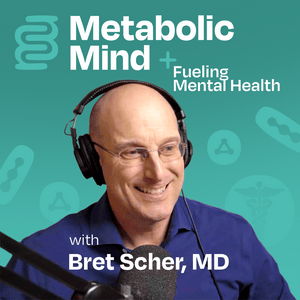Polycystic Ovary Syndrome (PCOS) is the leading cause of infertility in women, but what if the real issue isn’t the ovaries?
In this eye-opening conversation, Dr. Bret Scher speaks with Dr. Steven Palter, reproductive endocrinologist and founder of Gold Coast IVF, about the powerful connection between PCOS, metabolic health, mental health, and fertility.
For decades, PCOS has been treated symptom-by-symptom: birth control for irregular cycles, fertility drugs for ovulation, IVF for infertility. But Dr. Palter explains why this approach often misses the root cause: insulin resistance and metabolic dysfunction.
When you address the metabolic driver, everything can change.
Ketogenic and low-carbohydrate dietary approaches are showing promise in improving insulin sensitivity, restoring ovulation, improving mood, and even supporting fertility, often before significant weight loss occurs. In many cases, women who were preparing for IVF are conceiving naturally after correcting their metabolic health.
In this video, you’ll learn:
Why PCOS is best understood as a metabolic disorder
How insulin resistance drives infertility, mood changes, and long-term health risks
Why traditional “eat less, move more” advice often fails
How ketogenic therapy may restore ovulation and improve fertility
The connection between PCOS, depression, and binge eating
Why GLP-1 medications aren’t the same as metabolic repair
If you or someone you know is struggling with PCOS, infertility, or unexplained hormonal symptoms, this episode offers a hopeful and science-based perspective on what’s possible when metabolic health becomes the priority.
As always, consult your healthcare provider before making significant dietary changes.
💡Learn more about the safety and efficacy of ketogenic therapy on our “Is Keto Safe?” topic page: https://www.metabolicmind.org/resources/topics/is-keto-safe/
🔎 Have questions about how to apply metabolic therapies effectively? Submit them at metabolicmind.org/questions to be featured in a future Metabolic Mailbag episode.
#MetabolicMind #KetogenicTherapy #PCOS #InsulinResistance
Expert Featured:
Dr. Steven Palter
https://www.instagram.com/stevenpaltermd
https://www.tiktok.com/@stevenpaltermd
https://www.youtube.com/@StevenPalterMD
https://www.facebook.com/@stevenpaltermd
Resources Mentioned:
https://www.goldcoastivf.com/
pcosbaby.com
Free CME Clinician Trainings:
Are you a clinician who would like to learn more about the science behind these therapies and how to implement them in practice? Earn CME with our growing library of courses from some of the top experts in the field including Dr. Chris Palmer, Dr. Georgia Ede, Dr. Matthew Bernstein and Dr. Bret Scher with more coming soon.
Our courses have been made FREE by grants from Baszucki Group, so we can spread these powerful therapies as widely as possible. Earn CME/CNE credits: https://www.metabolicmind.org/for-clinicians/trainings-courses/?utm_medium=organic-social&utm_source=youtube&utm_campaign=cme-yt
Follow our channel for more information and education from Bret Scher, MD, FACC, including interviews with leading experts in Metabolic Psychiatry.
Learn more about metabolic psychiatry and find helpful resources at https://metabolicmind.org/
About us:
Metabolic Mind is a non-profit initiative of Baszucki Group working to transform the study and treatment of mental disorders by exploring the connection between metabolism and brain health. We leverage the science of metabolic psychiatry and personal stories to offer education, community, and hope to people struggling with mental health challenges and those who care for them.
Our channel is for informational purposes only. We are not providing individual or group medical or healthcare advice nor establishing a provider-patient relationship. Many of the interventions we discuss can have dramatic or potentially dangerous effects if done without proper supervision. Consult your healthcare provider before changing your lifestyle or medications.


